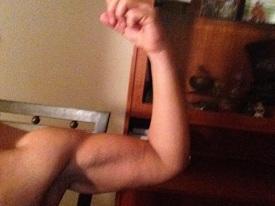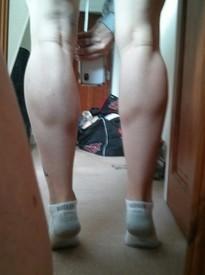Regained 60 pounds - starving and miserable.

emtjmac
Posts: 1,320 Member
I need help. I'm 35 years old and desperately trying to recreate the conditions that allowed me to lose 76 pounds before gaining most of it back. I believe that sedentary is the correct setting for me because most of my 64 - 72 hours per week at work are spent on a couch, in front of a computer/television. I am desperately hungry when I eat the recommended calories, shaking and miserable. I am up to date on all my blood work and have normal values including blood glucose and thyroid function. I work out 3 days per week most weeks with heavy lifting and running or cycling though I don't always log the exercise. I need to reduce my hunger and misery level or I'll be incapable of sustained weight loss. Really could use some earth-shattering advice here. Thanks in advance.
0
Replies
-
Eat more protein, fat and vegetables. Eat less carbohydrates and sugar. Before people jump down my throat for that, let me explain.
You will be more full from protein and fat than from simple carbs. You can eat less and feel more full. You won't get the blood sugar spikes that make you feel so hungry that you feel ill. It takes a few days to adjust to, but within a week I no longer felt any hunger.
After a month of low carb eating, I slowly introduced carbs back into my diet. I am still enjoying the benefits of cutting my addiction to carbs and thus my addiction to sugar. Again, before anyone rips me a new one for this philosophy on here, I am trying to specifically answer OP's question about not wanting to be hungry. I am well aware that you can "eat whatever you want" and lose weight as long as you're at a deficit. But why be starving in the process if you don't have to be?
Also drink LOTS of water. A glass when you wake up, one or two before each meal and one or two before bed. That is a new addition to my weight loss program and I feel like a million bucks.0 -
Age height weight gender exercise amount and calorie intake?0
-
This content has been removed.
-
Read the Sexypants post: http://www.myfitnesspal.com/topics/show/1080242-a-guide-to-get-you-started-on-your-path-to-sexypantsReally could use some earth-shattering advice here.0 -
Increase fats and protein. Consume slow burning carbs. Set goals. Remind yourself of your goals. Work toward them. It's not easy but you've done this before so you can do it again. Only this time, make it better!0
-
If you are set to sedentary you need to log and eat the exercise calories as well. Whole grains and fiber will also help keep you fuller longer0
-
Hi emtjac! Thanks for your post, as I think that a lot of people struggle with this concept: being hungry, working out all the time, and not losing weight.
I certainly struggled with this for a long time.
When I started reading body building forums though, I realized something important-- I was eating a lot of carbs... and the wrong type. Even though my daily calories were okay, my body was trying to tell me that it didn't have the resources to build and replenish the muscles I was trying to exercise!!!
Right now, (according to the last few days in your journal) you're eating about double the carbs that you are protein. Protein makes us feel full, and stops the "post workout" shaking I used to get... it's kind of punny, but protein shakes can help stop the "shakes"! It also has the added benefit of never being converted to fat.
Try switching the ratios. Try 40-50% of your calories from lean protein. For the first week, I kind of felt like there was a protein rock in my stomach, but week 2, I started feeling great! I've been able to have awesome workouts and am no longer shaking or lethargic, despite eating less calories total!
Here's some scientific explanations about the benefits of high-protein for weight loss:
"A period of heavy caloric restriction will increase your need for protein. People who are under great stress, such as people recovering from illness or a serious injury, will also need a bump in protein consumption. As you lower your total caloric intake, there is a greater chance that incoming protein will be used as a fuel source rather than for muscle-building. On a low-calorie diet, it's even more critical that you eat at least 1 gram of protein per pound daily to maintain muscle mass."
http://www.bodybuilding.com/fun/ultimate-protein-faq-10-protein-questions.html
"dietary protein modulates energy intake via the sensation of satiety and increases total energy expenditure by increasing the thermic effect of feeding. Whereas these effects did not contribute to weight and fat loss in those studies in which energy intake was fixed, one ad libitum study does suggest that a high-protein diet results in a greater decrease in energy intake, and therefore greater weight and fat loss."
http://onlinelibrary.wiley.com/doi/10.1301/00296640260184264/abstract
"The role of dietary protein in weight loss and weight maintenance encompasses influences on crucial targets for body weight regulation, namely satiety, thermogenesis, energy efficiency, and body composition. Protein-induced satiety may be mainly due to oxidation of amino acids fed in excess, especially in diets with “incomplete” proteins. Protein-induced energy expenditure may be due to protein and urea synthesis and to gluconeogenesis; “complete” proteins having all essential amino acids show larger increases in energy expenditure than do lower-quality proteins. With respect to adverse effects, no protein-induced effects are observed on net bone balance or on calcium balance in young adults and elderly persons. Dietary protein even increases bone mineral mass and reduces incidence of osteoporotic fracture."
http://www.annualreviews.org/doi/abs/10.1146/annurev-nutr-080508-1410560 -
I need help. I'm 35 years old and desperately trying to recreate the conditions that allowed me to lose 76 pounds before gaining most of it back. I believe that sedentary is the correct setting for me because most of my 64 - 72 hours per week at work are spent on a couch, in front of a computer/television. I am desperately hungry when I eat the recommended calories, shaking and miserable. I am up to date on all my blood work and have normal values including blood glucose and thyroid function. I work out 3 days per week most weeks with heavy lifting and running or cycling though I don't always log the exercise. I need to reduce my hunger and misery level or I'll be incapable of sustained weight loss. Really could use some earth-shattering advice here. Thanks in advance.
You need to be consistent in logging your exercises and eating back the calories needed to avoid being miserable. Being shaky from hunger isn't okay at all. Was the glucose test a fasting one? How is your blood pressure?
You're also really inconsistent in either your eating or your logging. One day you logged 800 calories? Some days are entirely blank.0 -
I think that you might like to look at Dr. Krista Varaday's research on the Every Other Day Diet (EOD). I just bought her book through Kindle that outlines the 10 year research that she has done on losing weight and keeping it off. Also you might want to look at Dr. Joseph Mercola's recommendations that sedentary workers get up every 15 minutes for a 1-2 minute stretch or walk around. Human did not evolve to sit! As someone who has lost and regained more than once I commiserate. I am hoping that that on the EOD diet those rebounding days are over! I expect to be part of the Success Maintenance group. Hope and hard work - and also enjoying life and food seems to help. Dr. Varaday has lots of advice for not feeling miserable, and for losing and maintaining. So far everything she has said is holding true for me.0
-
Can confirm. Eat more fat.
Check out Keto,
http://www.reddit.com/r/keto
http://www.reddit.com/r/keto/wiki/faq0 -
I'd give up that idea. We change. Diets that worked before often don't work again....desperately trying to recreate the conditions that allowed me to lose 76 pounds before ...
Eat more and/or differently if you're miserable, move more if it reduces your deficit so much you can't lose.
Good luck!0 -
Hi emtjac! Thanks for your post, as I think that a lot of people struggle with this concept: being hungry, working out all the time, and not losing weight.
I certainly struggled with this for a long time.
When I started reading body building forums though, I realized something important-- I was eating a lot of carbs... and the wrong type. Even though my daily calories were okay, my body was trying to tell me that it didn't have the resources to build and replenish the muscles I was trying to exercise!!!
Right now, (according to the last few days in your journal) you're eating about double the carbs that you are protein. Protein makes us feel full, and stops the "post workout" shaking I used to get... it's kind of punny, but protein shakes can help stop the "shakes"! It also has the added benefit of never being converted to fat.
Try switching the ratios. Try 40-50% of your calories from lean protein. For the first week, I kind of felt like there was a protein rock in my stomach, but week 2, I started feeling great! I've been able to have awesome workouts and am no longer shaking or lethargic, despite eating less calories total!
Here's some scientific explanations about the benefits of high-protein for weight loss:
"A period of heavy caloric restriction will increase your need for protein. People who are under great stress, such as people recovering from illness or a serious injury, will also need a bump in protein consumption. As you lower your total caloric intake, there is a greater chance that incoming protein will be used as a fuel source rather than for muscle-building. On a low-calorie diet, it's even more critical that you eat at least 1 gram of protein per pound daily to maintain muscle mass."
http://www.bodybuilding.com/fun/ultimate-protein-faq-10-protein-questions.html
"dietary protein modulates energy intake via the sensation of satiety and increases total energy expenditure by increasing the thermic effect of feeding. Whereas these effects did not contribute to weight and fat loss in those studies in which energy intake was fixed, one ad libitum study does suggest that a high-protein diet results in a greater decrease in energy intake, and therefore greater weight and fat loss."
http://onlinelibrary.wiley.com/doi/10.1301/00296640260184264/abstract
"The role of dietary protein in weight loss and weight maintenance encompasses influences on crucial targets for body weight regulation, namely satiety, thermogenesis, energy efficiency, and body composition. Protein-induced satiety may be mainly due to oxidation of amino acids fed in excess, especially in diets with “incomplete” proteins. Protein-induced energy expenditure may be due to protein and urea synthesis and to gluconeogenesis; “complete” proteins having all essential amino acids show larger increases in energy expenditure than do lower-quality proteins. With respect to adverse effects, no protein-induced effects are observed on net bone balance or on calcium balance in young adults and elderly persons. Dietary protein even increases bone mineral mass and reduces incidence of osteoporotic fracture."
http://www.annualreviews.org/doi/abs/10.1146/annurev-nutr-080508-141056
You're post was pretty good. I just want to clarify that proteins can be turned to fat. Glucogenic amino acids can be turned into glucose that can then be turned into fatty acids and ketogenic amino acids are converted to acetyl CoA or acetoacetyl CoA which can be used directly for fatty acid synthesis.0 -
You can try a concept called "volumetrics". If you switch to low-energy density foods you'd be amazed how much food you end up eating.
And here's my favorite trick: Make soup. I take one of the entrees from my diet, a chicken and rice thing. Make 2 cups of chicken bullion. Dump the entry in it. Awesome chicken soup, and you've tripled the volume of the meal for very few calories.0 -
Along with some of the advice above (more protein, more fat, more water) you need to remember that cutting calories sucks at first and then you get used to it. My first week while I was trying to figure out my macros and what worked for me was awful. I also regained what I lost but there was no way I could recreate what I did. I had a very physical job and no kid. Now I'm at a desk job and have a toddler. I had to figure out what works for me now: a big breakfast with fat, fiber, and protein. A medium lunch and small snacks. I also rarely eat after 3pm. But you need to figure out what works for you. And yeah, at first it's bad but then it goes away. Good luck.0
-
Not when eating at a caloric deficit, as OP mentioned he has been doing, and most of us on this website are doing. Excess is excess, no matter what, it will be stored as fat.0
-
How much are you trying to lose per week? If you are having difficulty it might make sense to reduce your goal a bit and then perhaps increase it more gradually. Also, I find it helpful to keep track of how I feel when (i.e., if I am really hungry a couple of hours after breakfast, what else is going on). That's often really illuminating.
I think there are a couple of common explanations (assuming your calories are reasonable). (1) Your food isn't satiating enough. If so, figure out when you are hungriest and start experimenting. I like having larger meals and don't care for snacking, so I make sure my meals all contain fat, protein, and lots of vegetables, since that keeps me full until the next meal. Volume matters to me more than calories (my mind seems to react to eating a lot of volume by feeling full), so I create full plates or have a sandwich with vegetable soup or a salad most of the time when I have a sandwich, etc. But other people find the mini meals thing to be more helpful, so you need to see what works for you. (2) A lot of this for me is mental. When I first started I'd feel like I needed to eat at times or in situations when I was used to eating. I figured I'd get over this, so I either ignored it, drank some water (or a diet soda would be fine too, IMO), or ate some carrots or some other snack that had few calories. That went away after a couple of weeks, because I was right that it was just mental.
Once I started feeling like this was working (seeing the losses) that helped a lot, and channeling my thoughts about food into other things (using that as a time to plan a healthy meal or set some goals or think about what I wanted to accomplish in the next workout) helped. I like the nerdy stuff about weight loss--spreadsheets and so on--so that is always a good way to divert myself.
Also, you should feel free to eat your workout calories, at least some, and if there's not a reason you can't workout, maybe try to add more activity in exchange for more food? Even just walking works for this. I have a desk job and was really out of shape when I started, but just walking as much as possible for errands and commuting and so on lifted me to lightly active (based on my Fitbit) which allowed me to eat more, and I continued losing at 2 lb/week, so I trust that, even though it didn't feel like I was doing that much.
Basically, you want to get that motivated feeling back--if it's not worth it to you, you won't do it, and if you are like me, feeling like it's a hardship will make it unlikely you will stay motivated for the necessary period of time, so you want to make it as easy as possible.0 -
Not when eating at a caloric deficit, as OP mentioned he has been doing, and most of us on this website are doing. Excess is excess, no matter what, it will be stored as fat.
That's true. Just wanted to be clear. So someone does read that and think "Sweet! Proteins can't be turned into fat! I can eat 500g a day."0 -
I'm a 5'6" girl who weighs 147 and I'm eating as much as you are and losing weight (slowly but losing). Why aren't you eating a whole heck of a lot more? Have you checked out the following link?
http://www.myfitnesspal.com/topics/show/1080242-a-guide-to-get-you-started-on-your-path-to-sexypants
I would also suggest reading about TDEE and BMR - my guess is that you should be eating a lot more even to lose 1 lb a week. My thought is to lose as little weight a week as possible in order to eat as much as possible. Honestly, I'm not eating very much differently than I will once I hit my goal and that is the point - you stopped DIETING and gained weight. So stop dieting and eat for life.0
This discussion has been closed.
Categories
- All Categories
- 1.4M Health, Wellness and Goals
- 398.1K Introduce Yourself
- 44.7K Getting Started
- 261K Health and Weight Loss
- 176.4K Food and Nutrition
- 47.7K Recipes
- 233K Fitness and Exercise
- 462 Sleep, Mindfulness and Overall Wellness
- 6.5K Goal: Maintaining Weight
- 8.7K Goal: Gaining Weight and Body Building
- 153.5K Motivation and Support
- 8.4K Challenges
- 1.4K Debate Club
- 96.5K Chit-Chat
- 2.6K Fun and Games
- 4.8K MyFitnessPal Information
- 12 News and Announcements
- 21 MyFitnessPal Academy
- 1.5K Feature Suggestions and Ideas
- 3.2K MyFitnessPal Tech Support Questions















